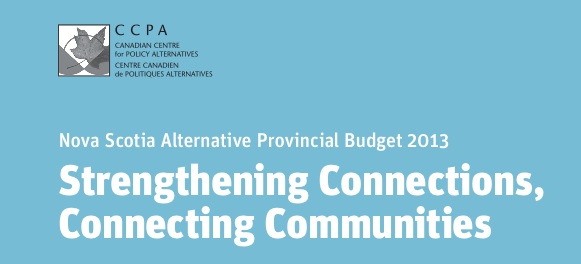The Nova Scotia provincial government is set to introduce its promised balanced budget this year. The Nova Scotia Alternative Budget, released today, proposes some concrete choices rooted in Nova Scotia communities. Rather than pay down debt, the NS-APB prioritizes balancing the social debt threatening Nova Scotia.
Can a budget really be considered balanced when unemployment is 9.3 per cent, and 47,000 Nova Scotians are ready, willing, and actively looking for work that isn’t there?
The recent recession hit some parts of Canada harder than others, and Nova Scotia is still feeling the effects. The Nova Scotia economy has picked up jobs since 2008, but all of them are part-time. The proportion of the population that’s employed hasn’t changed a huge amount (down 0.4 per cent since 2008), but there are more people participating in the labour force which results in a stubbornly high unemployment rate. Regional disparities in unemployment mean that rural communities are suffering from high rates of unemployment, and from an exodus of young families.
Household debt is at an unprecedented high, with Canadian families owing $1.65 for every $1 dollar of income.
The annual cost of poverty to Nova Scotia is $2.3 billion dollars, with over $600 million of that in direct costs to the provincial government.
At the same time, despite overwhelming agreement that the Canadian labour market remains quite weak outside of Alberta & Saskatchewan, the federal government is demonizing the unemployed, and cutting social programs and public services.
On the other hand, Nova Scota’s debt-to-GDP ratio has fallen from 49 per cent in 2000 to 35 per cent in 2011. The cost of servicing government debt has fallen from 20 per cent of government expenditures in 2002, to just over 9 per cent, thanks partly to the low cost of borrowing over the past few years.
So it shouldn’t be radical to suggest that the provincial government refocus its energies on building Nova Scotia communities — literally. The NS Alternative Budget proposes a broad range of affordable housing initiatives. These proposals put Nova Scotians to work, and provide cost-effective, humane solutions to current housing issues.
The NS-APB suggests the need for a Women’s Equality Action plan (unlike Flaherty’s Action! plans, I have a feeling they mean something deeper than a slick PR campaign). In the meantime, the NS-APB invests in community supports for women, addresses workplace harassment, and provides significant funding levels for training women in non-traditional sectors. In sectors where there are future skills shortages, we should be doing everything that we can to ensure the full participation of talented persons, reaching out to women, First Nations, New Canadians, and persons with disabilities.
An alternative budget is many things, but mostly it is a document to show that there is more than one way to prioritize government spending. The proposals that are laid out are fully costed, well thought through policy options, that meet the needs of Nova Scotians and build the communities that we want to live and work in. I recommend that you read it, share it with your friends, debate about elements that you like or don’t like. Bring it up with your elected representatives. Build connections, build communities, build a better Nova Scotia. Never let them tell you it can’t be done.



